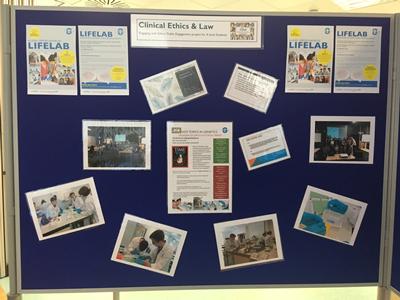
Project leads
Gillian Crawford - gc@soton.ac.uk (Clinical Ethics & Law, UoS) and Mirjam Plantinga - m.plantinga@umcg.nl (University Medical Centre Grongingen) with Kath Woods-Townsend (LifeLab, UoS)
Purpose
The main aim of the project was to discover what young people think about a new genetic test that makes it possible for couples considering parenthood to know whether their future baby has an increased chance of having a serious disease; and the ethical and societal implications of offering such a test.
A secondary purpose was to stimulate the young people’s critical thinking, and to explore effective ways of engaging with lay audiences about the issues surrounding genetic risks.
Audience
Local 6th form students and their teachers were invited to participate.
Background and motivation for the project
Researchers in Clinical Ethics and Law (CELS) at the University of Southampton are working with the University Medical Center Groningen to research the responsible implementation of a couple-based genetic test in healthcare.
Partnerships
The engagement activities were run in partnership with LifeLab at the University of Southampton.
Approach taken
Local 6th form teachers were invited to attend an evening on ‘engaging students in ethical debate’; five schools/colleges were represented (7 teachers in total). Following this, teachers were invited to express interest in involving their students in the next stage of the project. Interest was strong but practical difficulties (see below under ‘Challenges’) meant that pupils from two schools went on to attend a LifeLab ‘A’ Level day (tailored for this project), during which they were introduced to project work for a schools day a few weeks later (hosted at a local school).
The project work involved the students in critical analysis of a decision-aid for a pre-conception carrier screening (PCS) test, and debating the implications of offering such a test. Students from the two schools prepared for and against arguments on a number of questions related to the topic of pre-conception carrier testing such as, whether the test should be offered, how (via commercial or NHS setting), to whom (to couples only or to individuals) and when (when individuals reach reproductive age or only when planning a family). They then debated these with their contemporaries from the other school that had been working on the same arguments. It therefore developed their skills in critical thinking as well as confidence in debating but they also had to quickly establish relationships and common round with new people. They reported that they had enjoyed this aspect of working with the other school.
Achievements/outcomes
The team were very happy with the level of engagement achieved, and the opportunities it provided for informing future research plans and ongoing collaborations.
In terms of next steps the challenge is to build on this success through future collaborations with LifeLab, including funding applications.
Evaluation
Informal feedback was collected at the teacher’s event in Jan 2018, and via follow-up emails. Teachers responded that the event had been helpful and they were more confident to explore ethical issues with their students afterwards. All represented schools/colleges (save one) indicated keenness to participate in the next stage of the project.
For the LifeLab component, their standard evaluation process was used, with data forwarded on to the project team. Feedback was collected from both ‘sides’, ie including researchers/scientists who recorded on post-its: what went well, how engaged were students, what was difficult, potential changes for next time. Sample student responses:
‘[LifeLab/Meet the Scientist] allowed me to learn more about ethical implications of genetic research’
‘Its important to evaluate your health as often as possible and make sure you know exactly what’s going into your body.’
At the end of the Schools Day the students took part in a facilitated group activity to give feedback; responding to a series of questions posed to them, they took turns to answer – throwing/catching a bean bag to determine who would answer next, with a facilitator recording their answers. Teachers were also able to give feedback via follow-up email. Responses showed that the students enjoyed the opportunity to debate with peers from beyond their own school, and appreciated everyone’s engagement. They were also alert to issues around choice and opportunity with regard to genetic screening:
‘You should have the chance to do it.’
‘Choice is important.’
‘Offered, but not compulsory...maybe some criteria for offering it.’
Challenges and Lessons Learned
An initial challenge was in choosing the schools to be involved. The Lifelab participant cap and the subsequent group-work/debate meant the project could not be opened up to whole year groups at the larger 6th form colleges (100+), despite their interest in being involved; asking schools to select students seemed unfair. Fortunately engagement from two schools with smaller A Level Biology groups meant the project could proceed with both those groups working together. An upside of the challenge was that the larger colleges, who had not been involved with LifeLab previously, invited the team to go and give follow up talks about ethical issues in science – which could be delivered outside of the project.
A further challenge was around timing of the various events to fit in with the biology syllabus; this was achieved with some negotiation, but unfortunately it was not possible, once the project was completed, for the participants to attend the annual LifeLab Showcase to present their work. The Showcase date had already been fixed to accommodate all participating schools across the wider LifeLab programme; if future LifeLab events were to include A Level students, the Showcase timing would need to be reviewed.
Legacy
In terms of next steps the challenge was to build on this success through future collaborations with LifeLab, including funding applications. The project leads initially worked on a Wellcome Trust enrichment grant application, but subsequently decided to focus on CELS PE/PPI activities as part of the Wellcome Trust collaborative award which had already been secured.